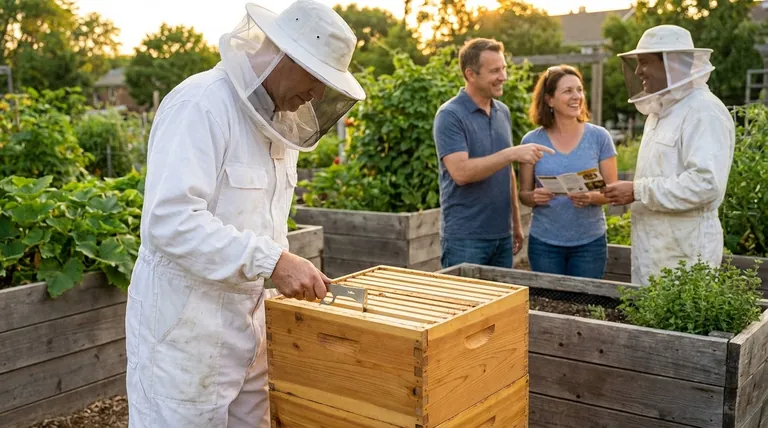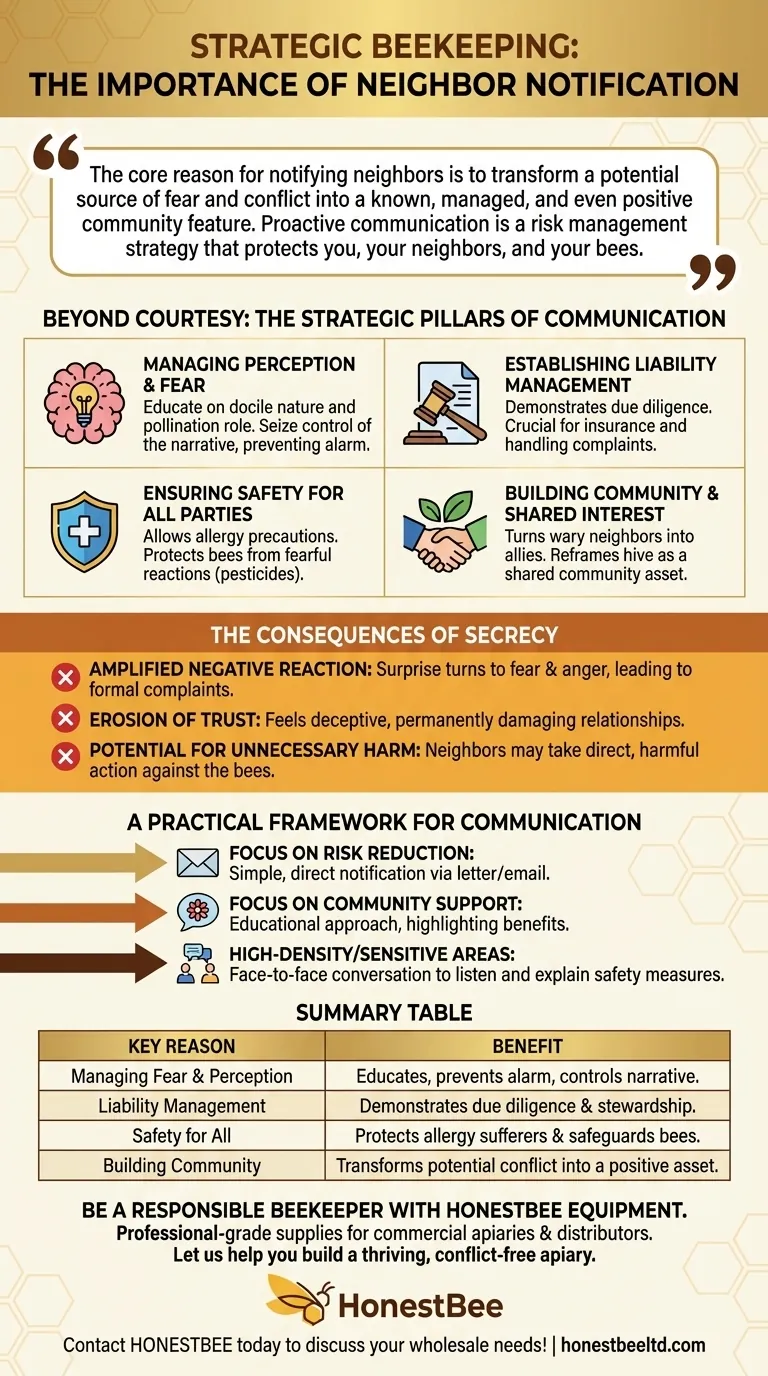Informing your neighbors about relocating a bee hive is a critical act of proactive management, not just a simple courtesy. It is essential for ensuring safety, preventing conflicts born from fear or surprise, and establishing yourself as a responsible steward of both your bees and your community.
The core reason for notifying neighbors is to transform a potential source of fear and conflict into a known, managed, and even positive community feature. Proactive communication is a risk management strategy that protects you, your neighbors, and your bees.

Beyond Courtesy: The Strategic Pillars of Communication
Simply moving a hive without context can create significant problems. A thoughtful communication strategy, however, builds a foundation for successful and peaceful beekeeping in a shared space.
Managing Perception and Fear
The public often does not distinguish between gentle honeybees and more aggressive insects like wasps or hornets. A sudden, unexplained appearance of thousands of bees can easily trigger alarm.
By informing neighbors, you seize control of the narrative. You can educate them on honeybee behavior, their docile nature when unprovoked, and their vital role as pollinators.
Establishing Proactive Liability Management
In any shared space, liability is a real concern. A bee sting, especially to someone with an allergy, can have serious consequences.
Documented communication demonstrates due diligence. It shows that you have taken responsible steps to inform those around you, which can be crucial in the event of an incident or complaint to a landlord, homeowner's association, or municipal body.
Ensuring Safety for All Parties
Your neighbors may have severe bee sting allergies (anaphylaxis) that you are unaware of. Informing them allows them to take necessary precautions and gives you critical information to consider for hive placement.
This communication also protects your bees. A frightened neighbor who feels they have no recourse might resort to pesticides or call an exterminator, resulting in the destruction of your colony.
Building Community and Shared Interest
Open communication can turn wary neighbors into allies. Many people are fascinated by bees and appreciate their environmental benefits.
Offering to share information, or even a small jar of honey once the hive is established, can create goodwill. It reframes the hive from a potential nuisance into a shared community asset that improves local gardens and ecosystems.
The Consequences of Secrecy
Choosing not to inform your neighbors is a significant gamble with predictable downsides. The risks of silence almost always outweigh the perceived convenience.
The Amplified Negative Reaction
Discovering a "secret" hive often elicits a much stronger negative reaction than being told about one in advance. Surprise can quickly turn to fear and anger, leading to immediate and formal complaints.
An issue that could have been managed with a simple conversation can escalate into a situation that forces you to remove the hive.
The Erosion of Trust
When neighbors find out about the hive indirectly, it can permanently damage your relationship with them. The act feels deceptive, and any future interactions will be colored by this initial breach of trust.
Once trust is lost, it is incredibly difficult to regain, making peaceful coexistence nearly impossible.
The Potential for Unnecessary Harm
A neighbor who feels threatened and uninformed is more likely to take matters into their own hands. This creates a direct physical threat to your bees and undermines all the work invested in the colony.
A Practical Framework for Communication
Your approach to communication should align with your specific environment and goals.
- If your primary focus is risk reduction: A simple, direct notification is sufficient. A letter or email explaining that you are a beekeeper and will be responsibly managing a hive at a specific location fulfills your basic duty.
- If your primary focus is building community support: Frame your communication as an educational opportunity. Share interesting facts about honeybees, highlight the benefits to local gardens, and offer to answer any questions they may have.
- If you are in a high-density or sensitive area: A direct, face-to-face conversation is best. This allows you to listen to concerns, show empathy, and explain the specific safety measures you are taking, such as using entrance reducers or strategic placement to direct flight paths away from common areas.
Ultimately, transparent communication is the defining characteristic of a skilled and responsible beekeeper.
Summary Table:
| Key Reason | Benefit |
|---|---|
| Managing Fear & Perception | Educates neighbors, prevents alarm, and controls the narrative. |
| Liability Management | Demonstrates due diligence and responsible stewardship. |
| Safety for All | Protects people with allergies and safeguards your bees from harm. |
| Building Community | Transforms a potential conflict into a shared, positive asset. |
Be a Responsible Beekeeper with the Right Equipment from HONESTBEE
Successfully managing your apiary and maintaining positive community relations starts with professional-grade supplies. HONESTBEE supplies beekeeping supplies and equipment to commercial apiaries and beekeeping equipment distributors through wholesale-focused operations.
We provide the durable, reliable gear you need to manage your hives responsibly and efficiently. Let us help you build a thriving, conflict-free apiary.
Contact HONESTBEE today to discuss your wholesale beekeeping supply needs!
Visual Guide

Related Products
- HONESTBEE Advanced Ergonomic Stainless Steel Hive Tool for Beekeeping
- Professional Dual-End Stainless Steel Hive Tool for Beekeeping
- Versatile Ratchet Hive Strap with S-Hooks for Secure Fastening
- Professional Galvanized Hive Strap with Secure Locking Buckle for Beekeeping
- Professional 3-Bar Frame Grip with Integrated Hive Tool
People Also Ask
- What is the hole in a hive tool for? A Multi-Tool for Apiary Repairs and Maintenance
- How should beekeepers handle bees when using a hive tool? Master Calm, Deliberate Techniques
- What is the significance of professional hive-making tools? Scale Your Stingless Bee Farm with Precision Equipment
- How does the hive splitting process contribute to colony management? Master Your Apiary Recovery Strategies
- What is the function of a professional stainless steel hive tool in IFB? Optimize Your Colony Strength Assessment



















